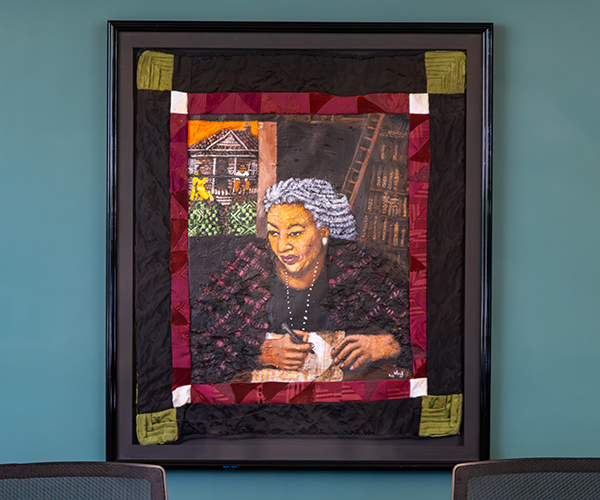In 1983, Thrity Umrigar took flight from her native India. She was 21 years old, had never flown alone, and now, as she fumbled with her seat belt, she was soaring above the Bombay of her youth, bound for a place she chose because of the lyrics of a song.
Umrigar dreamed of being a writer, even if it meant breaking the grasp of a family that loved her, leaving the tight circle of the Parsi community that had nurtured her.
It wasn't easy. But almost 30 years later, the Cleveland Heights author is about to release her fifth novel, The World We Found, which landed on January's Indie Next List from the American Booksellers Association.
The World We Found begins with a pain similar to her departure: a broken tooth and the news that a close friend has cancer. Umrigar, the maestro of the metaphor, applies pain to her characters the way a physical therapist bends an injured knee until you're certain it's going to snap. She makes us feel the pain of poverty, the slap in the jaw during a bad marriage, the death of a child. The pain of being prevented from being the person you need to be.
Her books also are about flight, defying the gravity of those real-world afflictions. There are the literal flights of an airplane or balloons and the figurative flights of reinvention. All are voyages of hope.
"I'm a hopeful person," she says during a recent interview at a coffee shop on Lee Road. "I can't stand books that don't give you hope."
The confluence of pain and hope is evident even in the final pages of her memoir, First Darling of the Morning, as she's about to board that plane back in '83: "And when you go," her father tells her at the airport, "I will lose not only my daughter, but my best friend." Yet he lets go because he loves her, because he must set her free to begin her flight to become the writer she needs to be.
So let's start her journey there, up in the air, where her memoir leaves off.
"I am rising — rising like hope, rising like the prayers that are undoubtedly on the lips of all the family members I have left on the ground. Bombay is underneath me, faint as a memory, distant as love." — First Darling of the Morning
Thrity Umrigar landed in Columbus, Ohio, quite by accident. Or maybe fate. When she was applying for graduate school in America, she had to list her top three choices. No. 1 was Columbia University, her home country's most renowned journalism graduate school. No. 2 was a California school. She was struggling to find a third pick until she heard Joan Baez singing "Banks of Ohio" on her stereo.
It's a song about great sorrow. Perhaps it was predestined that she be accepted to The Ohio State University's graduate school for journalism.
Those first months were a time of split emotions. "I was totally free and independent for the first time in my life," she recalls. But there were also "moments of great sadness and guilt at the thought of being that far away from my family. It was almost as if I was living on two, parallel tracks — even as I enjoyed every new experience, I longed to share it with them."
She pursued a career in journalism because in India she could imagine few alternatives for an aspiring author. "Journalism ... gave me opportunities to write that I wouldn't have had," she says. "And as an immigrant, it proved to be a wonderful, quick introduction to the real America."
In India she learned about America from Simon and Garfunkel, John Steinbeck, All the President's Men, Mad magazine, and Archie and Veronica.
But she found a different America when, armed with a master's degree and her student visa, she got her first job in 1985 at The Lorain Journal.
"Nothing could've prepared me for Lorain in the mid-1980s," she says. "Not even the slums of Bombay, where I used to volunteer as a teenager, compared to the sense of dejection, of defeatism that hovered over the city in those years."
Unemployment was high. U.S. Steel had laid off about 10,000 workers a few years earlier, while another 2,000 were lost as George Steinbrenner moved his shipbuilding operations to Tampa.
"There was just this sense of failure and loss that hung in the air," she recalls.
"And yet, in the midst of all this," she continues, "I met people of such grace and generosity and resilience. It seems like something that connects the poor of the world — the less they have, the more they are ready to share it."
The pay was low, the hours were long, but Lorain proved to be a fruitful training ground, as she quickly grasped the disciplined rhythm of journalism. Umrigar covered the prerequisite five Cs of community newspapers — cops, courts, councils, classrooms and corporations. Her writing stood out even then.
"She wanted to comb through every word," says Richard Osborne, who was associate editor in Lorain then. "She wanted every single word to be absolutely the best word to describe what she meant."
Umrigar also made a lifelong friend in Lorain: Regina Brett. "We were sort of like kids just having a ball back then," Brett recalls. "We were getting paid to write. It was a high, ... a kind of joy that's unmatched."
Their lives couldn't have been more different until then. Umrigar was an only child who grew up in cosmopolitan Bombay then took off alone for America. Brett, one of 11 children, had never ventured too far beyond her home in Ravenna. She was a 30-year-old single mother who had tried several careers before she latched onto journalism.
Yet they shared a passion for words and stories. "Lorain is by the lake, but it felt like an ocean to us. Some nights we just sat out there and talked and talked," Brett says. "We felt like everything was possible."
"Yes, I grew impatient and gave her the bloody push that made her get off the fence. But the free fall, the blind drop, the beautiful flight into her new future, why, that was all her own." — If Today Be Sweet
Regina Brett and Thrity Umrigar joined the Akron Beacon Journal a few months apart, just before the paper won the Pulitzer Prize in 1987 for its coverage of the attempted takeover of Goodyear Tire and Rubber.
There was a sense that there were no limits to what you could accomplish through journalism, Umrigar recalls. "You felt you could take chances, try anything."
That atmosphere seemed to create an incubator for authors that included Chuck Klosterman, David Giffels and Terry Pluto.
"We talked about writing all the time," says Umrigar, who sat next to Giffels in the newsroom. "We would engage in wordplay, exchange jokes, lyrics to songs all day long. We talked about books, music ... and story ideas. There were so many writers I admired there."
Brett, Umrigar and others often organized brown bag lunches to hear speakers or discuss writing topics. "It was sort of organic," Giffels says. "I know that working around all those people inspired me and challenged me."
Umrigar gravitated toward stories that generated both pain and compassion. "The wheelchairs are lining up outside for Thrity," an editor once joked. Yet she could find hope and warmth in tales as diverse as the premature birth of a baby boy and the murder of a beloved transvestite.
Her command of the language and gift for storytelling were nurtured by her upbringing. She grew up a Parsi, a small religious sect, not many more than 100,000 worldwide, with most living in Bombay. Parsis put a premium on education. She went to Catholic schools because they were the best available. Everyone spoke and wrote in English.
As a child, Umrigar was a scamp, the "Mad Parsi" to her schoolmates, charming them with pranks and jokes. Behind the laughs, though, was a difficult relationship with her mother.
Umrigar often imagined she was the daughter of the Ovaltine lady, who looked so loving in the advertisements. As a little girl, she often retreated to her books and to writing poems when the dissonance in their home became too shrill. And she longed to see flowers in the family's unadorned apartment.
"All the things that I thought made life worth living — books, art, music, nature — were considered to be indulgences," she recalls. "Every time I brought fresh flowers home, I would get a lecture on saving my money, not wasting it. So I vowed to myself when I was a teenager that as soon as I was independent, I would buy fresh flowers all the time."
While working as a reporter, she returned to India when she could. On one of those visits, she went to the seaside with her father. His words remain seared in her memory.
"I want to tell you something today that I want you to never forget," he told her. "There may come a time when I'll be old and sick, and you will come to visit me. ... I might ask you to stay by my side. If that day should ever come, I want you to remember what I'm telling you now, while I'm able in mind and body — I don't ever want you to do that. I would want you to leave and build your own life. You have chosen to live in America. ... Forget about us, and build your own life."
Thrity stayed at the Akron paper for 15 years, probably too many.
The last few years, she tried to balance work with getting her doctorate from Kent State University and writing a first novel about Parsi friends reminiscing about growing up together in Bombay. She got more speeding tickets than sleep. She finally put the novel on the shelf until she won a fellowship to the Neiman Foundation at Harvard University for the 1999-2000 school year. She took advantage of the time away to finish Bombay Time.
When she returned to the paper, it was soon time to jump off the fence.
"After 17 years of reporting and writing about other people's ideas, words and beliefs, I really wanted to express my own," she says. "I felt like there were things I wanted to say, worlds I wanted to describe, people I wanted to memorialize. None of that was possible in journalism. That box began to feel smaller and smaller, too restrictive."
In 2002, she made the leap, taking a visiting professor position at Case Western Reserve University with no job security and less pay than Akron. Her first novel was well-received but only a modest hit.
Regina Brett had already moved on to The Plain Dealer, but she knew her friend needed to go, too. "Thrity was like a kite, ... and we were holding on too tight," Brett says. "She always saw the greater world. It was her time to soar."
"All Bhima can see are the balloons, rising and floating over the dark water like severed heads. ... Bhima squints her eyes and watches their flight, watches for a long time, until the last balloon disappears from her sight." — The Space Between Us
Thrity Umrigar didn't realize she used flying as a metaphor so often in her writing until we discussed it in October.
"I do believe that life is movement," she says. "Standing still is death. And in our globalized world, movement often means flight — moving away from the past, from the familiar, from the known world to the unknown. I have been lucky so far in that each journey has led to something better."
Success followed Bombay Time. Her second book, The Space Between Us, the story of a wealthy Indian woman and her long-time maid, Bhima, was an international hit. She was hired to a tenured position at Case, teaching both journalism and literature, and continued to write, publishing The Weight of Heaven and If Today Be Sweet in addition to her memoir.
"I have been able to achieve the life I imagined for myself," she says. "I live today in a home that is filled with books. I buy fresh flowers whenever I can."
Her writing has introduced her to other writers, who have become friends. "Earlier this year, I friended Salman Rushdie on Facebook," she says. "I wrote to him about how much his Midnight's Children meant to me when I was a young woman about to leave India for the U.S., and he wrote back a wonderful, gracious reply. It was a totally surreal moment, and now I write to Salman as if he is my next-door neighbor."
So while she seems far removed now from the country she left in 1983, India has never been far away in her words. She is already at work on another novel, I Begins, about an immigrant woman from India and her African-American therapist.
But the India of her books is not the mystical, romantic India that fascinates Americans. It is a country that struggles with class, with race, with religion ... just like most nations do. "My novels could be set in any country," she says.
The World We Found bridges Thrity's two worlds. Four Indian women — friends who were going to change the world when they were in college — try to connect 30 years later. Armati, who moved to Ohio, has an inoperable brain tumor. Laleh and Kavati, both still living in India, are making plans to fly to America before she dies. But they are compelled first to find their fourth musketeer, Nishta, the bold one who married a Muslim and has been out of touch for years.
In less skillful hands, this could have been a Bollywood version of The Big Chill: University friends who were going to save the world but settled into middle-class lives gather at the death of one of them.
Instead, the depth and drama of the story turns on the two main male characters, husbands of two of the women, Adish and Iqbal. Iqbal, the Muslim, is a troublingly complex character who evokes both fear and pity. A fundamentalist, he is a man most would perceive as a monster. But Umrigar asks us to try to understand what made him that way.
What is even more remarkable is how she tells the story through all six characters, crawling into their skins instead of observing them from a literary mountaintop. "She goes to a place that's deeper than anyone I know," Brett says. "She never removes herself. ... She can climb into anybody's life."
Including the young woman who took that flight of faith in 1983 to Ohio, where her father joined her several years ago.
"That flight paid off handsomely," Umrigar says, with a slight smile that reveals that finding success here was no easier than leaving her family there.
"It was part of the whole concept of reinvention," she says. "It was about being something different tomorrow. ... That was the essence of the America I came to in the ... 80s."
That was the world she found.



